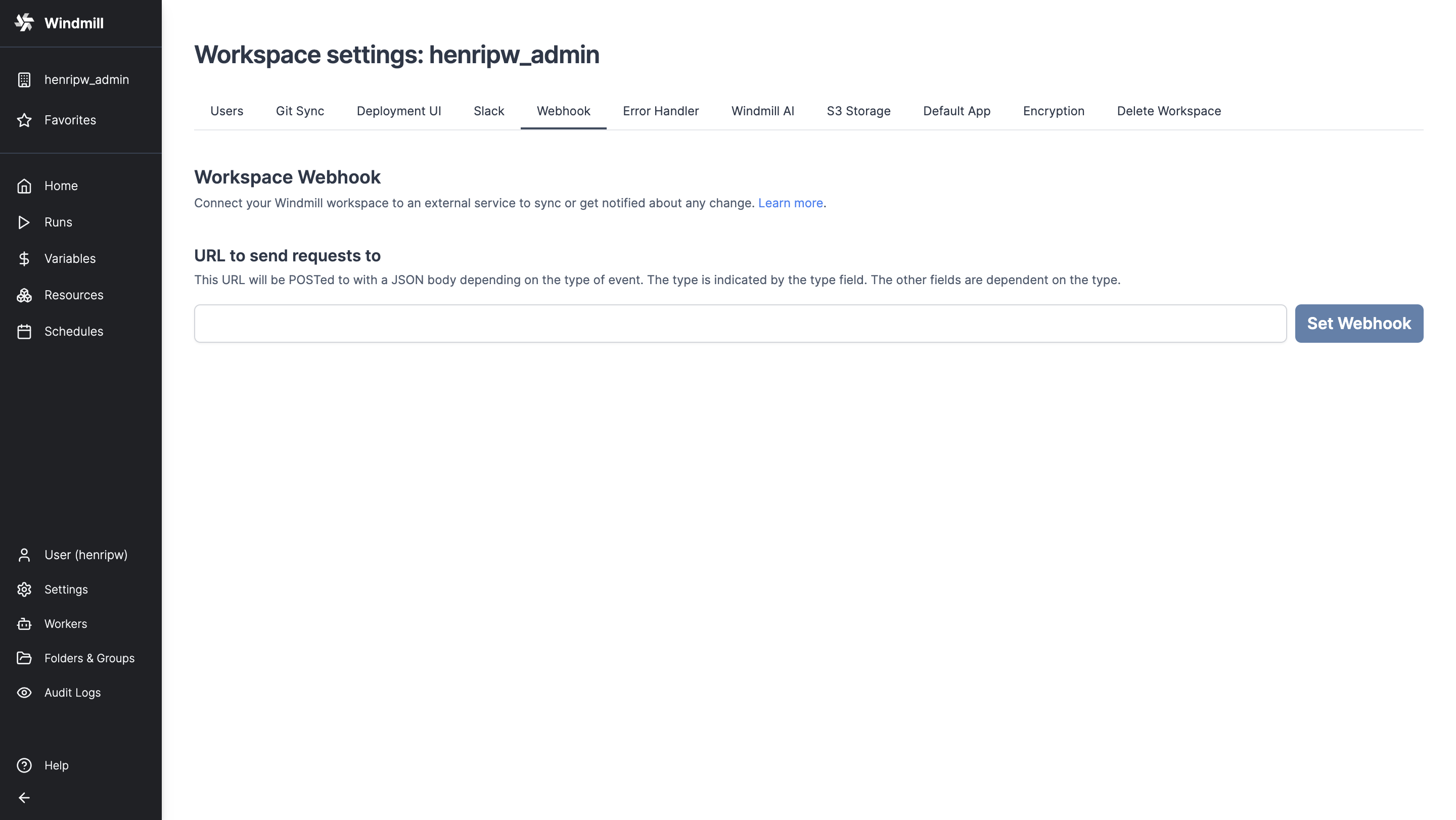Webhooks
Webhooks are a way to interact with Windmill using standard web technologies.
Snippet of a Deno/TypeScript script using only native JavaScript to trigger a webhook can be found on Windmill Hub.
Some use cases include triggering scripts and flows from Slack or Emails.
Webhooks for scripts & flows
Each script and flow created in Windmill gets autogenerated webhooks. The webhooks depend on how they are triggered, and what their return values are.
Addresses
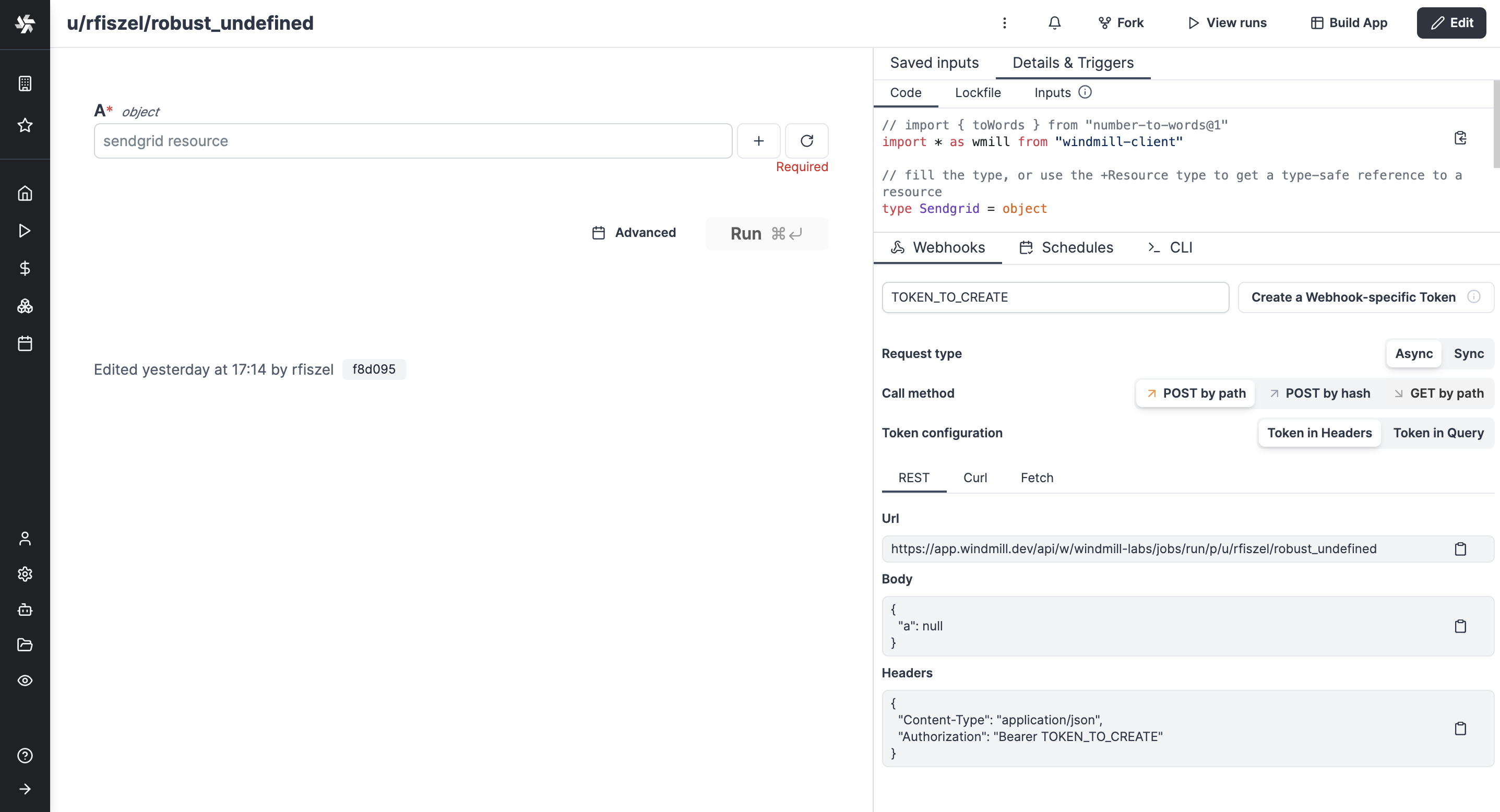
Webhook links can be found on the Detail page of each Script and Flow, on the Details and Triggers tab. For more information about Scripts or Flows, refer to the Getting started section.
Each webhook has two URLs, one with the path to the script, i.e.
/p/u/<your_user>/<your_script_name>, which will always trigger the latest
version of the Script/Flow and the other one with just a hash, i.e. /h/<hash>,
hiding potentially sensitive information and always corresponding to that
version of the script, even with overwrites.
Asynchronous
Jobs can be triggered in asynchronous mode, meaning that the webhook is triggered, and the returning value is the uuid of the job assigned to execute the underlying code
These links are available in the "UUID/Async" tab.
Synchronous
The second type of autogenerated endpoint is the synchronous webhook. This webhook triggers the execution, automatically extracts the underlying code's return value and returns it as the response.
Every script exposes an endpoint that triggers the Script but waits for its full execution before returning.
The endpoint has the following format:
https://app.windmill.dev/api/w/$WORKSPACE_ID/jobs/run_wait_result/$SCRIPT_PATH
where $SCRIPT_PATH is the path of the Script in the workspace, including the prefix u/ or f/
These links are available in the "Result/Sync" tab.
For scripts, there is an additional synchronous webhook available that accepts a GET request. The payload must be passed as the query arg payload and encoded in JSON first, then in an URL safe base64, e.g: encodeURIComponent(btoa(JSON.stringify({a: 2}))). This endpoint has the same URL as the Result/Sync POST Path URLs.
Be cautious with potentially long-running jobs in synchronous mode.
You can set a max timeout for sync endpoints at the instance-level.
Asynchronous vs. Synchronous
It's always better to use asynchronous mode as it allows your client not to wait for the response and it avoids Windmill to have to maintain a connection to your client while the job is running. However, for short-running jobs where it's easier in your code to block until you get a response, then use the synchronous mode.
When using the synchronous mode, the webhook returns the result of the script directly. If the script returns an error, the default behavior is to return a 200 status code with the error as a JSON object. You can customize the https status code if needed.
When using the asynchronous mode, the webhook returns a uuid and you can poll the get job API call to fetch the status and results once it is completed.
User token
To interact with Windmill you always need to use Bearer token authentication.
You can generate tokens for your own account in the Account Settings menu in the app. Open it by clicking your username on the side menu, then select "Account settings".
Labels are only used to allow users to easily distinguish keys.
You can only see the token once, when it's created. Make sure to store it securely!
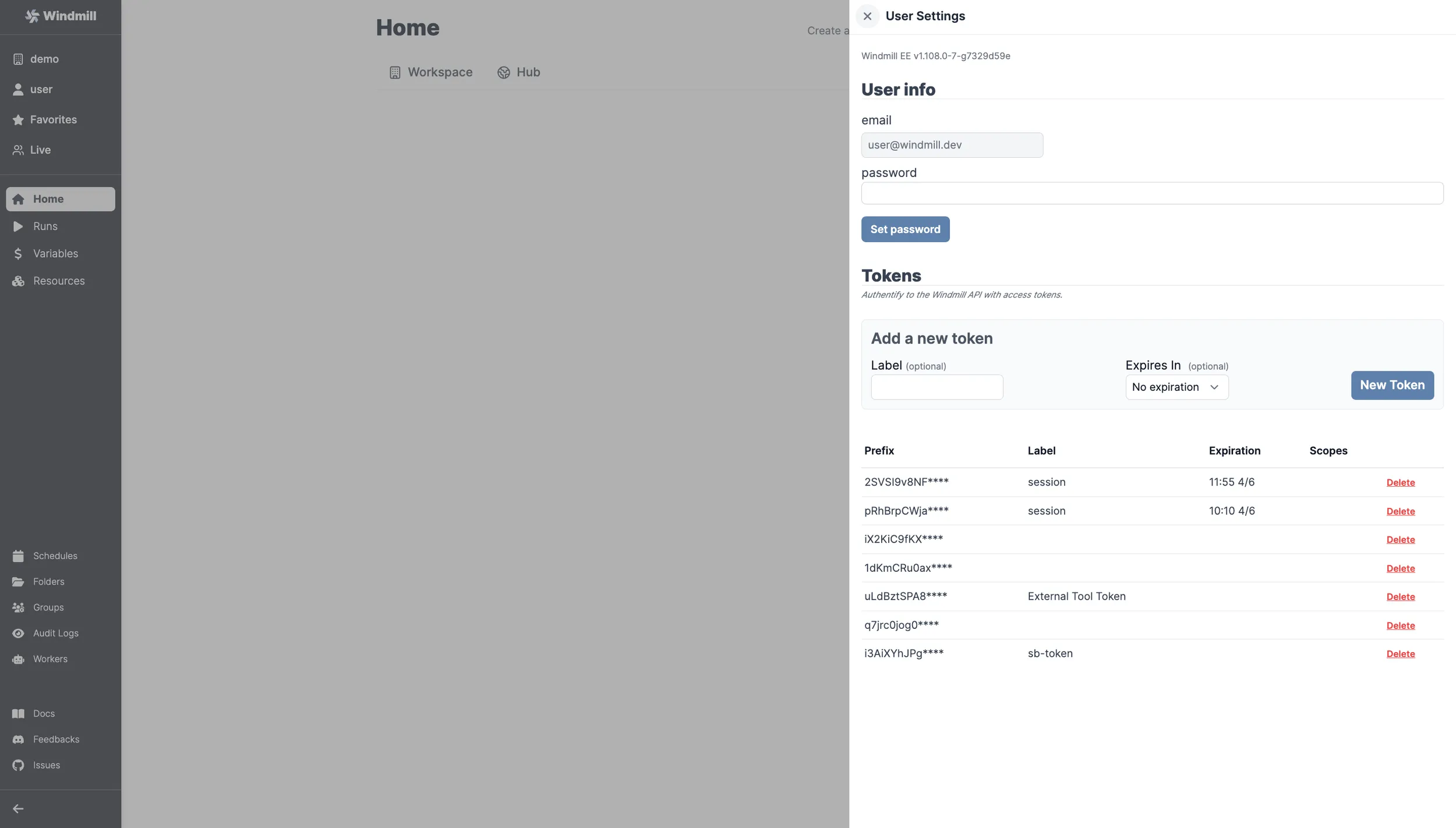
Webhook specific tokens
Webhook specific tokens allow sharing tokens publicly without fear since the token will only be able to trigger a specific script/flow and not impersonate you for any other operations.
It also avoids the hassle of having to create an anonymous user and check their permissions. If you can run the script yourself, then the webhook specific token will still inherit your own permissions.
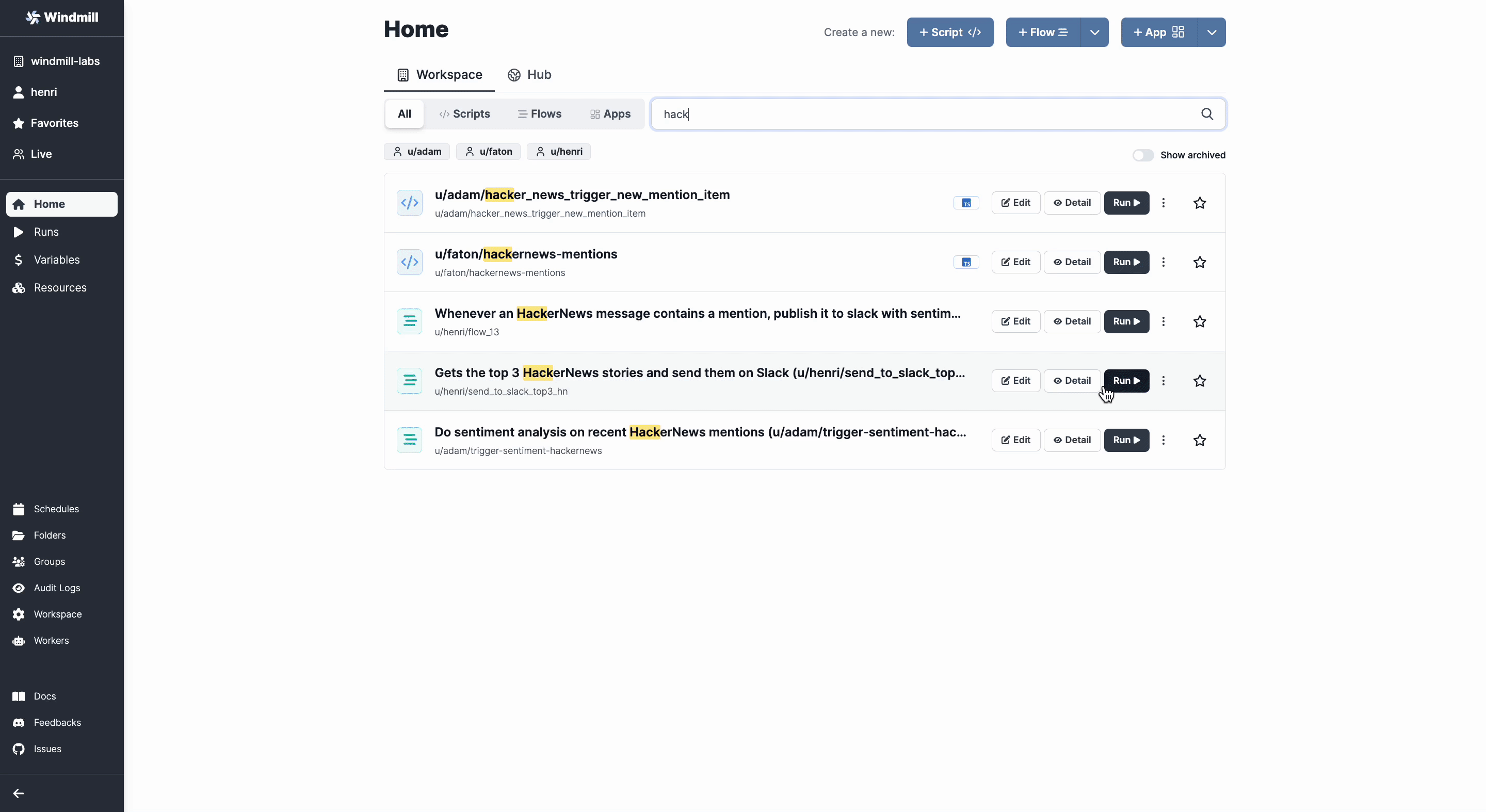
Triggering
Once you have a webhook URL and a user token, issue a request to the endpoint and you will get the appropriate return as response.
The bearer token must be passed as either an Authorization: Bearer <TOKEN>
header, or as a token query parameter:
https://<instance>/<route>?token=<TOKEN>
Due to security reasons, it is highly recommended to pass the token in the header. If it's not possible, then URL that contains the token should be treated as a secret (for more context please check OWASP ref.1 and OWASP ref.2).
Examples using cURL for POST requests:
## Request with Header
curl -X POST \
--data '{}' \
-H "Content-Type: application/json" \
-H "Authorization: Bearer supersecret" \
".../w/demo/jobs/run_wait_result/p/u/bot/hello_world_deno"
## Query parameter
curl -X POST \
--data '{}' \
-H "Content-Type: application/json" \
".../w/demo/jobs/run_wait_result/p/u/bot/hello_world_deno?token=supersecret"
Examples using cURL for synchronous GET requests:
## Request with Header".
curl -X GET \
-H "Content-Type: application/json" \
-H "Authorization: Bearer supersecret" \
".../w/demo/jobs/run_wait_result/p/u/bot/hello_world_deno?payload=<URL_SAFE_BASE64_ENCODED_JSON>"
You can find an example using only standard Deno libraries on the Windmill Hub.
You can also verify that the job has been triggered and run (or investigate any encountered issues), by checking the Runs menu on the app.
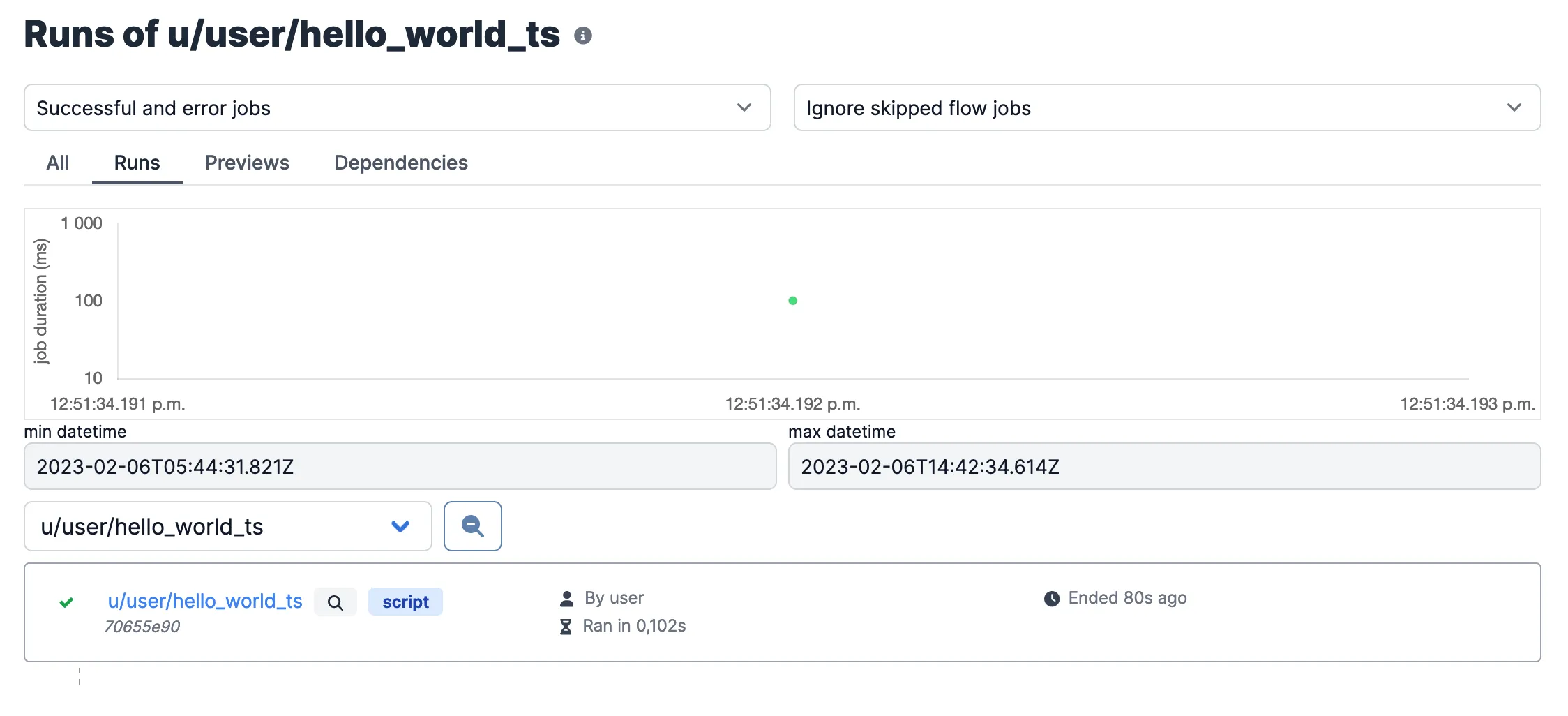
Body
The webhook endpoints accept a JSON object or url encoded form data as the body, where each key corresponds to an argument of the script/flow.
Non object payload / body
If the payload is not an object, it will be wrapped in an object with the key body and the value will be the payload/body itself. e.g:
[1,2,3] => {"body": [1,2,3]}
and your script can process it as:
def main(body: List[int]):
print(body)
Wrapping body, handling arbitrary payload
You can also force the payload to be wrapped in an object at the key body by passing the query arg wrap_body=true. This is useful when the payload is not not known in advance and you want to handle it in your script. e.g:
Python:
def main(body: Any):
print(body)
Typescript:
export async function main(body: any) {
console.log(body);
}
Raw payload / body
Similarly to request headers, if the query args contain raw=true, then an additional argument will be added: raw_string which contains the entire json payload as a string (without any parsing). This is useful to verify the signature of the payload for example (discord require the endpoints to verify the signature for instance).
Handling form data (file uploads)
The webhook endpoints also accept multipart/form-data, useful for file uploads. The payload should be a FormData object, where each key corresponds to an argument of the script/flow.
For file fields, the value will be an array containing s3 objects with the path to the uploaded files in the workspace object storage (e.g., S3).
Here's an example script for handling form data with a file field:
- TypeScript
- Python
import { S3Object } from 'windmill-client';
export async function main(mytextfield: string, myfilefield: S3Object[]) {
return myfilefield;
}
import wmill
from typing import List
def main(mytextfield: str, myfilefield: List[wmill.S3Object]):
return myfilefield
A workspace object storage must be configured to accept form data payloads.
Request headers
It is possible for jobs to take request headers as arguments. To do so, either specify in the query args the headers to process at include_header, separated with ,. e.g:
/api/w/workspace/jobs/run_wait_result/p/u/user/new_script?include_header=X-Sign,foo
or use the env variable: INCLUDE_HEADERS with the same format so that all requests to any job will include the headers.
Query args
It is possible to pass query args to the job. To do so, either specify in the query args the headers to process at include_query, separated with ,. e.g for a sync get request (works for all endpoints):
/api/w/workspace/jobs/run_wait_result/p/u/user/new_script?include_query=a,b,c&a=foo&b=bar&c=foobar
to have a: "foo", b: "bar", c: "foobar", passed as args.
Custom response code
For all sync run jobs endpoints, if the response contains a key windmill_status_code with a number value, that value will be used as the status code. For example, if a script or flow returns:
{
"windmill_status_code": 201,
"result": {
"Hello": "World"
}
}
the synchronous endpoint will return:
{
"Hello": "World"
}
with a status code 201.
Note that if the status code is invalid (w.r.t RFC9110), the endpoint will return an error.
Custom response content type
Similarly to the above, for all sync run jobs endpoints, if the response contains a key windmill_content_type, the associated value will be used as the content type header of the response. For example, if a script or flow returns:
{
"windmill_content_type": "text/csv",
"result": "Hello;World"
}
the synchronous endpoint will return:
"Hello;World"
with the response header: "Content-Type: text/csv".
Custom response headers
Similar to the above, for all sync run jobs endpoints, if the response contains a key windmill_headers, the headers will be added to the response. For example, if a script or flow returns:
{
"windmill_headers": { "X-Custom-Header": "foo" },
"result": {
"Hello": "World"
}
}
the synchronous endpoint with return the result with the header X-Custom-Header: foo (in addition to Content-Type: application/json).
It's better to use windmill_content_type to override the content type, as the output will be correctly formatted.
Return early for flows
It is possible to define a node at which the flow will return at for sync endpoints. The rest of the flow will continue asynchronously.
Useful when some webhooks need to return extremely fast but not just the uuid (define first step as early return) or when the expected return from the webhook doesn't need to the full flow being computed.
Exposing a webhook URL
Single port proxy can be leveraged to expose a webhook with a custom URL. In its docker-compose, Windmill uses Caddy but the logic can be adapted for others.
In the Caddyfile, the handle_path and rewrite directive can be used:
{$BASE_URL} {
bind {$ADDRESS}
handle_path /mywebhook {
rewrite * /api/w/demo/jobs/run_wait_result/p/u/bot/hello_world_deno"
## You can optionally inject the token in Caddy to have the endpoint exposed publicly
## request_header Authorization "Bearer <WINDMILL_GENERATED_TOKEN>"
}
...
reverse_proxy /* http://windmill_server:8000
}
The job can then be triggered with:
curl -X POST \
--data '{}' \
-H "Content-Type: application/json" \
".../mywebhook?payload=<URL_SAFE_BASE64_ENCODED_JSON>"
Cloud events 1.0
Windmill's webhooks aim to be compatible with the Cloud Events 1.0 specification. The envelope metadata will be parsed into a special argument WEBHOOK__METADATA__ for scripts and flows.
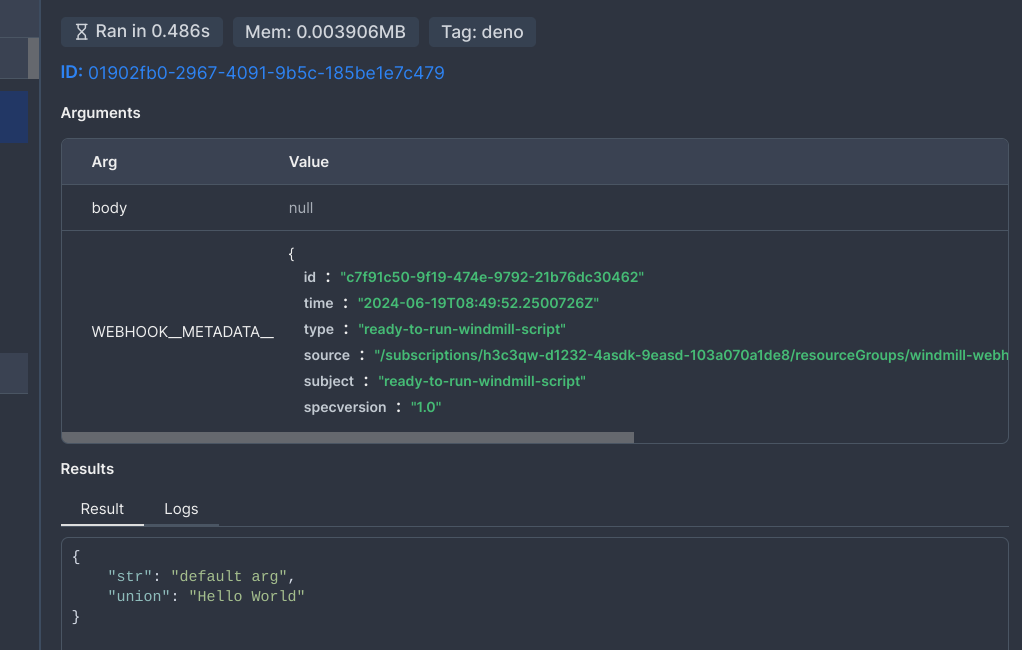
Nothing extra needs to be done on Windmill's side, if a request has the cloudevent content header it will automatically be handled according to the specification. When using webhook producers that allow it, you can select to use the cloud events schema. For example with Azure Event Grid:
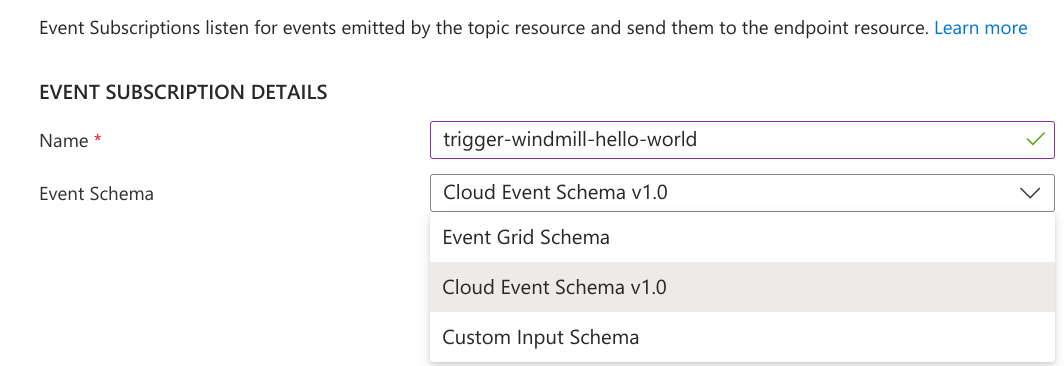
Windmill does not support batching cloud events yet. This means that requests with the content type set to 'application/cloudevents-batch+json' will return an error response.
Learn more about what Cloud Events are here.
Delete after use
For a script, delete logs, arguments and results after use.
This settings ONLY applies to synchronous webhooks. If used individually, this script must be triggered using a synchronous endpoint to have the desired effect.
The logs, arguments and results of the job will be completely deleted from Windmill once it is complete and the result has been returned.
The deletion is irreversible.
SSE stream webhooks
In addition to classical webhooks, runnables are associated with SSE Stream Webhooks. These are only useful when the runnable returns a stream. Learn more about result streaming here. They trigger the job and then return an SSE stream.
The endpoints follow the same convention as classical webhooks, but use the base path /api/w/workspace/jobs/run_and_stream/.
You can find the SSE Stream Webhook URL on the Detail page of each Script and Flow, under the Details and Triggers tab.
They support both GET and POST requests.
To get the stream updates of an existing job with SSE, use /api/w/:workspace/job_u/getupdate_sse/:id (pass query arg ?fast=true for a new job to get fast polling at first)
For flows, a stream will be returned if the last step is a script that returns a stream.
The SSE stream returns JSON objects with the detailed shape available here. For the stream endpoint, you will mainly get the following events with different available fields:
// update event with new result stream data
{
"type": "update",
"new_result_stream": "string", // string: new result stream data since last update
"stream_offset": 456 // integer: current result stream offset
}
// update event with result once job is complete
{
"type": "update",
"completed": true, // boolean: whether the job is completed
"only_result": {...} // JSON result
}
The first event is sent one or more times as the stream progresses with new data.
The second event is sent when the job is complete, containing the result of the job in the only_result field.
The result will be a string containing the complete stream or a JSON object with the complete stream in the wm_stream field if there is already a result.
Always use the only_result field to get the complete result at the end, as the final part of the stream might not be sent separately in a new_result_stream event.
Export webhook definitions to OpenAPI
Windmill supports generating an OpenAPI 3.1 specification that includes both HTTP routes and webhook triggers.
Webhook endpoints included in the spec:
- Are matched using filters you define
- Include
summaryanddescriptionif available - Are automatically mapped to use JWT Bearer authentication in the spec
You can generate this from the Custom HTTP routes page.
Workspace webhook
Connect your Windmill workspace to an external service to sync or get notified about any change.
From workspace settings, go to the "Webhooks" tab and fill an URL under "URL to send requests to".
